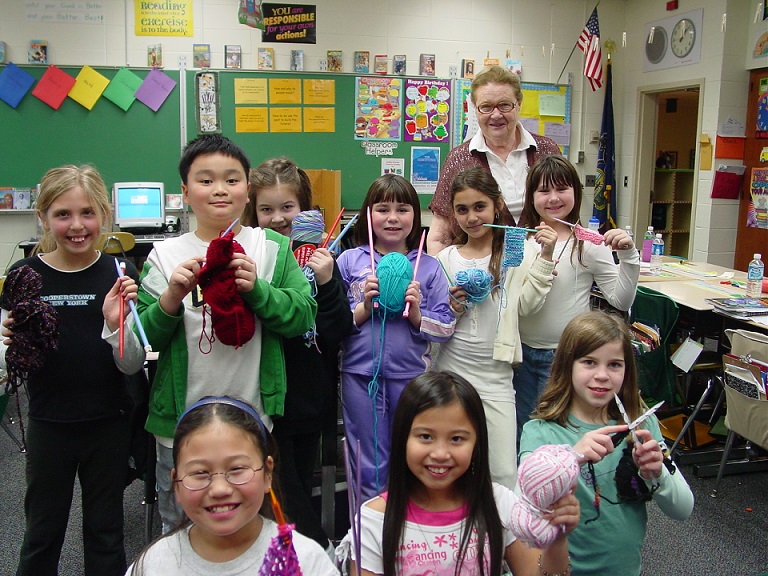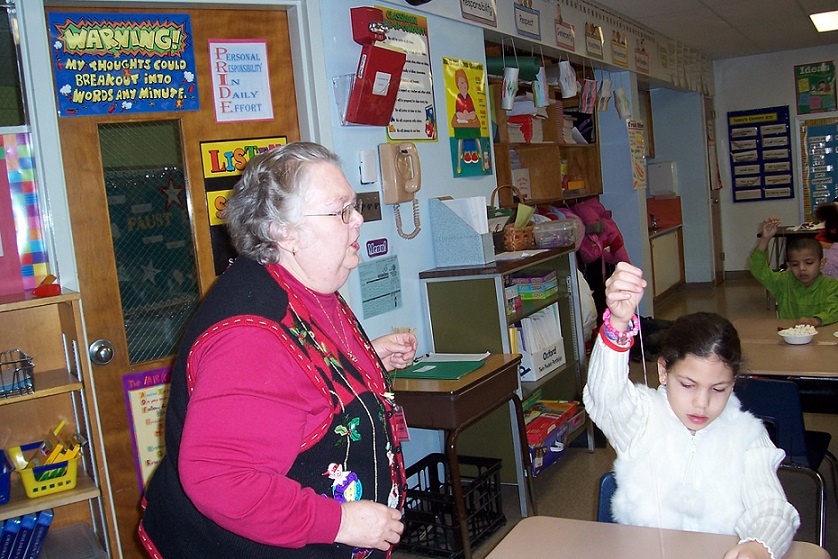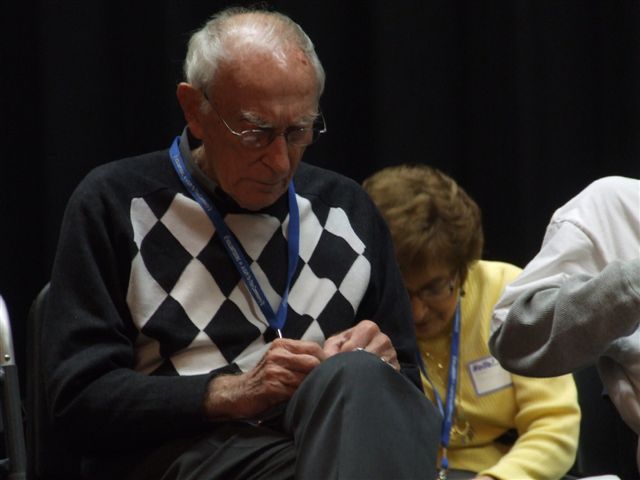
S.A.G.E. Utilizes the Wisdom of Seniors to Enrich the Lives of Youth
Senior Adults for Greater Education (S.A.G.E.) appears to be a match made in heaven. The organization pairs seniors with young people, to the betterment of both, a great use of community “assets.” We think this is a great idea, and were happy to support S.A.G.E. by awarding the organization one of our small grants. Kars4Kids spoke to Executive Director Beryl Katz to learn more about this work:
Kars4Kids: Who came up with the idea of pairing seniors with school children? Why seniors?
Beryl Katz: My life story arcs into the story of S.A.G.E going back to 1998, when I was 42-years-old. I was an English teacher who had put her career on hold to raise two children as a stay-at-home mother and a parent volunteer at our children’s school. I attended a school board meeting where there were two critical topics were on the agenda. First, the district sought to lower the class size ratio without employing additional staff. Secondly, the district was attempting to create a second high school.
The community was split on the issue of need a second school. People who did not have students in school had one thought, while the parents of the children had the opposite point of view. From my position, I could relate to both viewpoints. Parents of the then current school children supported the idea of a second school. Older individuals without children in the school system voiced cogent arguments as to why this was unnecessary.
My “aha moment” came when I realized that those who no longer had children in the school system did not understand how education had changed since the time when their own children had been in school. They also may not have realized how the value of their homes was directly tied to quality of the schools in this school district. It was at that moment that I envisioned the older individuals coming into the schools as volunteers. This would give that group a firsthand view of how schools and the education system had changed, while at the same time give them a chance to assist in reducing the student-to-staff ratio. Utilizing the skills, experience, and wisdom of the older generation to enrich the younger generation just seemed natural.
I approached the school board president with this idea. Together we went on to present the concept to the superintendent, who offered little hope of success, but perhaps more importantly, granted me the opportunity to try and put this idea into action. That opportunity led to what S.A.G.E. is today, an organization that has engaged over 900 senior volunteers who contribute more than 6,500 hours of annual service to the schools in their communities.

Kars4Kids: Can you give us some idea of the age range of your senior volunteers?
Beryl Katz: We have volunteers aged 55 all the way up to 95 years of age!
Kars4Kids: How do seniors benefit from your programs?
Beryl Katz: Here’s a list of the apparent benefits from our program for the seniors who sign on with us:
- Increased satisfaction and purpose
- Enhanced self-esteem. Since an individual’s self-concept is often a reflection of the views of others, the self-images of older participants are enhanced through intergenerational exchange.
- The addition of new and positive meaningful relationships with children and professionals within the community. While collaborating with students on educational projects, older adults can provide a valuable service as mentors, helpers, and more. By offering their knowledge and experience our volunteers can make meaningful contributions.
- An understanding and acceptance of today’s youth.
- Opportunities to transfer knowledge, skills and values to the next generation.
- A reduction in the sense of isolation so common to seniors.
- An increase in the stimulation of mental capacities,
- An increase in the connection to the community.
- A rekindling of the joy of learning and living.
- Continued involvement in the community, creating alliances with those who have children in the schools, and those who do not.
Kars4Kids: How do the students benefit from your programs?
Beryl Katz: Here’s a list of student benefits we have observed as a result of our program:
- Increased self-esteem
- An increase in knowledge, skills, and learning
- Increased understanding and an appreciation of aging and older persons
- A change in perception regarding commonly held stereotypes associated with aging and older adults
- New and positive connections to and meaningful relationships with older people
- Mentoring relationships have been shown to positively affect students in need of extra attention with the addition of positive supportive role models
- Increased appreciation for the legacy that seniors have created for the younger generation
- A changed, more accurate perspective from a deeper understanding of historical context
- An increased sense of connection with the community
- A realization that learning is a lifelong process
- An understanding that by giving of themselves, students can make a difference in the world
Kars4Kids: Can you give us a rundown of your program?
Beryl Katz: S.A.G.E. is a successful organization that recruits and places volunteers ages 55 and over in schools in partner districts working together with administrators, teachers’ unions, and school boards to implement the program. Currently, S.A.G.E. volunteers contribute 6500 hours of service by providing academic assistance to students in grades K-12. The program offers a variety of commitment levels for volunteers depending on the desires of partner districts which includes weekly and episodic volunteering opportunities.
For weekly volunteers, opportunities are plentiful and include: math review, reading assistance, help with writing assignments, assisting students who are below grade level to achieve proficiency on state mandated tests, helping ESL students and more. Additionally, our volunteers have shared their knowledge and experience on a variety of topics. One volunteer spoke to middle school students about anorexia, while another shared experiences on growing up in Cuba. A former archaeologist brought in Romans artifacts to share with students studying Latin.

Research has shown that adults over the age of 55 comprise an increasingly large percentage of our population and have a desire to volunteer their time, impact youth, and make important contributions to their communities. S.A.G.E. fulfills these needs by providing an ideal vehicle for older adults to remain engaged in society. Our volunteers engage by helping students achieve academic success while offering unconditional acceptance and support. The presence of our volunteers in the classrooms provides specialization which enhances the educational experience for each student in the class while also enriching their lives.
Kars4Kids: Has it ever happened that a senior volunteer becomes ill or passes away during the school year? How is this handled with the children affected by such an unfortunate event?
Beryl Katz: Yes, this has happened and was one of the most poignant memories. A lovely gentleman and his wife both volunteered in the same school but in different classrooms. Bernie came to school and volunteered on a Friday, and passed away over the weekend. The teacher had to explain this to a class of third graders.
In order to give them an outlet for their feelings, the teacher gave class time to students to express their appreciation and sadness to Bernie in notes. These notes were then passed along to the family. When I attended the service for Mr Jalbert and viewed the body these notes were clutched in his folded hands.
Kars4Kids: How has the coronavirus pandemic affected your work?
Beryl Katz: We created a training module for our volunteers to teach them to use Google Meet and Zoom. All volunteers practiced how to do this, and some are slowly beginning to volunteer in their classrooms remotely. We want to keep the connection for our volunteers and schools to prevent our volunteers from experiencing loneliness and depression.
Kars4Kids: How much of the work between seniors and students happens in the classroom or in the virtual classroom?
Beryl Katz: All of our work happens in the schools within earshot or eyeshot of a staff member. All our volunteers are screened for the safety of all. Currently we are working to bring virtual volunteering into the program.
Kars4Kids: What’s next for S.A.G.E.?
Beryl Katz: We would very much like to expand our program to other school districts. We realize that with the increased life span of seniors, our volunteers want to remain involved and give back to a cause. Sharing knowledge promotes the feeling of leaving something behind. Over our 21 years of operation, we have realized the power of these connections and want others to experience the benefits as well.